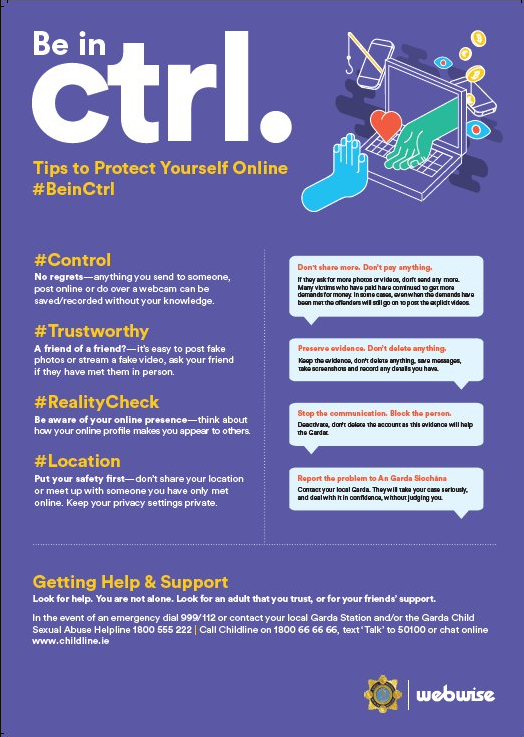Webcam Blackmail – Advice for Parents
Young people are using video and webcam chat to hang out with friends and meet new people. There are risks, such as webcam blackmail that can arise from the inappropriate use of these services. As with all other issues, proactive parenting can have a big impact on reducing the risks. We have put together some talking points to help you talk about the issue with your child. The video below on sextortion from the BBC may be a good starting point to show your child an example of what webcam blackmail is and will illustrate how convincing pre-recorded footage can be.
- Remind your child that sometimes people aren’t who they say they are. It may look and feel as if you talking to a real person when in fact it is a video recording. This can be very convincing and children/young people have more of a tendency to believe what they see.
- Talk to your child about using friends only setting on their social media sites. In many cases of webcam blackmail/sextortion, criminals initially make contact with victims via popular social networking sites. Children should always be wary of accepting friends or speaking online with someone they do not know.
- Ask your child if they think it is possible to pretend to be someone else in a live video chat.
- Ask your child what they could do to make sure the person they are chatting with is who they appear to be
- Young people or children are often aware of the dangers of sharing images or video, however, they may not realise how easy it is for the other person to record the video chat session and share it online. For this reason, children often feel that they can be freer in video chat as it feels like there is no record that the content they broadcast disappears into the ether. However, it is very easy to record without them knowing. The ‘Granny Rule’ is often helpful when discussing sharing private pictures/video online. Ask your child to consider before sharing anything online how they would feel if their Granny saw pictures/footage of them.
- Make an agreement with your child on suitable privacy settings for social networks. It’s a good idea to keep accounts set to ‘friends only’. This helps avoid strangers from making contact.
What Happens if My Child is a Victim of Webcam Blackmail?
- Sometimes that first step of asking for help is a difficult one. Try to stay calm and not overreact. Reassure your child by reminding them that many people have had similar experiences.
- Ask your child to avoid looking at the video and any comments.
- Be supportive. Incidents of webcam blackmail can be extremely sensitive and be embarrassing for a child, they will need your compassion and reassurance.
- It is important that your child provides you with as much information about the incident as they can. This can help get images or videos get removed from websites and will help if there is a criminal investigation.
- Do not pay any money to blackmailers as there is no guarantee that paying money will end the threat. There have been many webcam blackmail incidents where fraudsters have demanded more money from victims after they have already paid a sum of money.
- Record any details you can about the fraudsters – their profile, web chat account, Skype account, bank account number etc.
- If the fraudster has uploaded a video of your child online, report this video immediately to the website on which it’s hosted. Do a search online for any other sites that may have hosted the video content. Illegal online activity can also be reported to Hotline.ie.
- Contact the Gardaí and report the incident. Extortion is illegal. Depending on the nature of the footage or images recorded, they might also be illegal and considered to be child pornography.
- If a payment has been made, contact your bank as soon as possible to cancel the payment.
- Report the fraudster to the site/service where contact was initially made.
- If your child is very distressed it’s important that they have someone with whom they can speak. A professional counselor might be able to help. Childline offers a listening support service for children.
Advice from An Garda Síochána
The Online Child Exploitation Unit (OCEU) at the Garda National Protective Services Bureau (GNPSB) offers the following advice:
• Protect your online life – use the maximum privacy settings.
• Be aware that people online may not be who they claim to be.
• Keep control online – do not share explicit or intimate images with anyone.
If you believe you are a victim of this type of crime, you should do the following:
1. Don’t share more, don’t pay anything.
2. Look for help. You are not alone.
3. Preserve evidence. Don’t delete anything.
4. Stop the communication. Block the person.
5. Report it to An Garda Siochana.
This activity is a crime. Adults, as well as children, can be victims.
To contact An Garda Síochána:
• Call in person too, or telephone your local Garda Station;
• In the event of an emergency dial 999/112 or
• Contact the Garda Child Sexual Abuse Helpline 1800 555 222.
It is best that you turn off the computer media (eg, Smartphone, tablet or laptop) on which the problem communication took place and have it available for examination by the Garda Síochána.
Useful Links
Childline: childline.ie/
Hotline.ie: hotline.ie/
Say No: europol.europa.eu/online-sexual-coercion-and-extortion-crime






